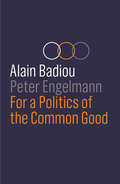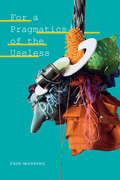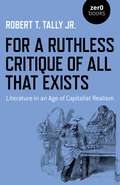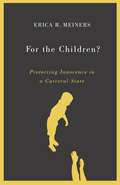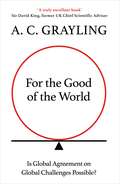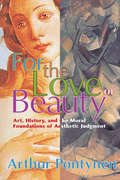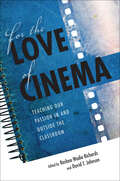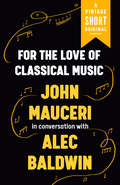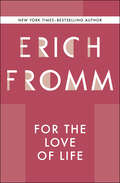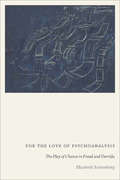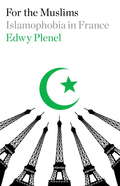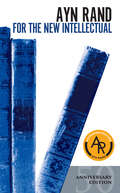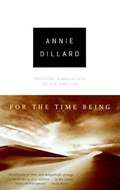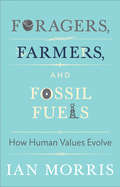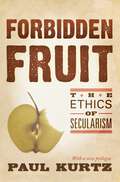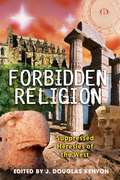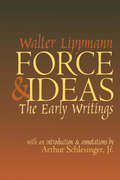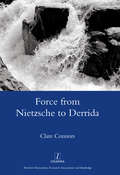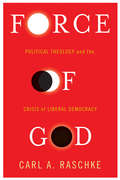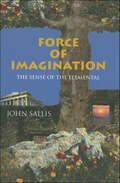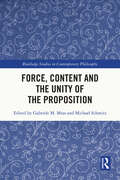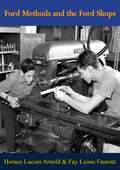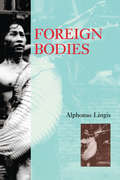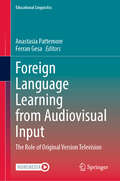- Table View
- List View
For a Politics of the Common Good
by Alain Badiou Peter EngelmannThis volume of conversations between Alain Badiou and Peter Engelmann focuses on the concrete political situation in the world of today. Here the validity and applicability of Badiou’s ideas are tested in relation to the great social and political problems of our time, including terrorism, migration, the surge in support for nationalist and populist parties and the growing gap between rich and poor. Badiou argues that in the age of today’s globalized capitalism, with its division of labour on a global scale and the worldwide interconnection of information through the Internet, there are no longer any national solutions. Because nations and states lose meaning in favour of transnational corporations in globalized capitalism, resistance to capitalism must by definition be global too. Only a politics that defines itself as a politics for all and does not act in the interests of one particular group – whether a nation, religion or community of shared values – can lead the world out of the current crisis of globalized capitalism.
For a Pragmatics of the Useless (Thought in the Act)
by Erin ManningWhat has a use in the future, unforeseeably, is radically useless now. What has an effect now is not necessarily useful if it falls through the gaps. In For a Pragmatics of the Useless Erin Manning examines what falls outside the purview of already-known functions and established standards of value, not for want of potential but for carrying an excess of it. The figures are various: the infrathin, the artful, proprioceptive tactility, neurodiversity, black life. It is around the latter two that a central refrain echoes: "All black life is neurodiverse life." This is not an equation, but an "approximation of proximity." Manning shows how neurotypicality and whiteness combine to form a normative baseline for existence. Blackness and neurodiversity "schizz" around the baseline, uselessly, pragmatically, figuring a more-than of life living. Manning, in dialogue with Félix Guattari and drawing on the black radical tradition's accounts of black life and the aesthetics of black sociality, proposes a "schizoanalysis" of the more-than, charting a panoply of techniques for other ways of living and learning.
For a Ruthless Critique of All that Exists: Literature in an Age of Capitalist Realism
by Robert T. Tally Jr.For a Ruthless Critique of All that Exists takes as its point of departure two profound and interrelated phenomena. The first is the pervasive sense of what Mark Fisher had called &“capitalist realism", in which (to cite the famous expression variously attributed to Fredric Jameson and Slavoj Žižek) it is easier to imagine the end of the world than then end of capitalism. As Jameson in particular has noted, &“perhaps this is due to some weakness in our imaginations,&” and the attenuation of the imaginative function in cultural criticism has far-reaching implications for the organization and reformation of institutions more generally. This manifests itself as a waning of speculative or theoretical energy, which in turn leads to a general capitulation to the tyranny of &“what is,&” the actually existing state of affairs, and the preemptive disavowal of alternative possibilities. Connected to this is the second phenomenon: the prevalent tendency in literary and cultural criticism over the past 30 or more years to eschew critical theory and even critique itself, while championing approaches to cultural study that emphasize surface reading, thin description, ordinary language philosophy, object-oriented ontology, and post-critique. Together these forms of anticritical and antitheoretical criticism have constituted a tendency that has in its various incarnations come to dominate the humanities and other areas of higher education in recent years. The latter has served to reinforce the former, and the result has been to align literary and cultural criticism with the broad-based forces of neoliberalism whose influence has so deleteriously transformed not only higher education but the whole of society at large. Robert T. Tally Jr. argues that, in order to counter these trends and empower the imagination, the time is ripe for &“a ruthless critique of all that exists,&” to borrow a phrase from the young Marx. This book is intended as a provocation, at once a polemic and a call to action for cultural critics.
For the Children?: Protecting Innocence in a Carceral State
by Erica R. Meiners&“Childhood has never been available to all.&” In her opening chapter of For the Children?, Erica R. Meiners stakes the claim that childhood is a racial category often unavailable to communities of color. According to Meiners, this is glaringly evident in the U.S. criminal justice system, where the differentiation between child and adult often equates to access to stark disparities. And what is constructed as child protection often does not benefit many young people or their communities. Placing the child at the heart of the targeted criminalization debate, For the Children? considers how perceptions of innocence, the safe child, and the future operate in service of the prison industrial complex.The United States has the largest prison population in the world, with incarceration and policing being key economic tools to maintain white supremacist ideologies. Meiners examines the school-to-prison pipeline and the broader prison industrial complex in the United States, arguing that unpacking child protection is vital to reducing the nation&’s reliance on its criminal justice system as well as building authentic modes of public safety. Rethinking the meanings and beliefs attached to the child represent a significant and intimate thread of the work to dismantle facets of the U.S. carceral state. Taking an interdisciplinary approach and building from a scholarly and activist platform, For the Children? engages fresh questions in the struggle to build sustainable and flourishing worlds without prisons.
For the Good of the World: Is Global Agreement on Global Challenges Possible?
by A. C. Grayling&‘A must read&’ Gordon Brown &‘A truly excellent book&’ Sir David King The three biggest challenges facing the world today, in A. C. Grayling&’s view, are climate change, technology and justice. In his timely new book, he asks: can human beings agree on a set of values that will allow us to confront the numerous threats facing the planet, or will we simply continue with our disagreements and antipathies as we collectively approach our possible extinction? As every day brings new stories about extreme weather events, spyware, lethal autonomous weapons systems, and the health imbalance between the northern and southern hemispheres, Grayling&’s question – Is Global Agreement on Global Challenges Possible? – becomes ever more urgent. The solution he proposes is both pragmatic and inspiring.
For the Love of Beauty: Art History and the Moral Foundations of Aesthetic Judgment
by Arthur PontynenFor most of the last century the methodology of art history has followed a positivist approach, emphasizing form and style, fact and history as the means of studying works of art. By contrast the philosophical pursuit of truth, once central to the fine arts and humanities has largely been abandoned. In For The Love of Beauty, Arthur Pontynen offers a searching and ambitious critique of modern aesthetic practice that aims to restore the pursuit of the knowledge of reality--Being--to its rightful place.Pontynen begins by addressing the question of why the pursuit of truth (be it called Dao, Dharma, God, Logos, Ideal, etc.) is no longer acceptable in academic circles even though it has been intrinsic to the purpose of art at most times and in most cultures. Lacking the pursuit of truth, of some degree of knowledge of what is true and good, the humanities necessarily lack intellectual and cultural grounding and purpose. Fields of study such as philosophy, music, art, and history are therefore trivialized and brutalized. Pontynen's focus on the study of the visual arts details the how the denial of purpose and quality in modernist and postmodernist aesthetics has denied art any possibility of transcending entertainment, therapy, or propaganda.In place of the established narratives, Pontynen offers a counter-narrative based on a cross-cultural pursuit of the good, the true, and the beautiful. He recognizes that substantively different cultural traditions exist and that the truth claims of each may be valid in whole or in part. He shows how the history of art parallels the intellectual history of Western culture and how these parallels affect both aesthetics and ethics. Pontynen engages with those elements of modernist and postmodernist thought that might be true. His purpose is not simply to deny their validity but to engage a viewpoint that does not privilege the notion of a purposeless cosmos. For the Love of Beauty will be of interest
For the Love of Cinema: Teaching Our Passion In and Outside the Classroom
by Rashna Wadia Richards David T. JohnsonWhat role does love—of cinema, of cinema studies, of teaching and learning—play in teaching film? For the Love of Cinema brings together a wide range of film scholars to explore the relationship between cinephilia and pedagogy. All of them ask whether cine-love can inform the serious study of cinema. Chapter by chapter, writers approach this question from various perspectives: some draw on aspects of students' love of cinema as a starting point for rethinking familiar films or generating new kinds of analyses about the medium itself; others reflect on how their own cinephilia informs the way they teach cinema; and still others offer new ways of writing (both verbally and audiovisually) with a love of cinema in the age of new media. Together, they form a collection that is as much a guide for teaching cinephilia as it is an energetic dialogue about the ways that cinephilia and pedagogy enliven and rejuvenate one another.
For the Love of Classical Music (A Vintage Short)
by Alec Baldwin John MauceriA Vintage Shorts Original Selection In an illuminating and probing conversation with renowned actor, producer, comedian and philanthropist Alec Baldwin, John Mauceri reflects on the enduring appeal of classical music, how he learned to lead an orchestra, his upbringing and how he became the acclaimed conductor and musical director he is today. Covering such varied topics like the personal and cultural significance of different composers&’ pieces and the singular experience of hearing music performed live, this intimate and inviting dialogue opens a window onto the extraordinary mind of a masterful conductor and an illustrious devotee of life on the stage. An ebook short.
For the Love of Life
by Erich FrommThis poignant philosophy about the human capacity for love in the face of tragedy from the New York Times–bestselling author is as relevant today as it was when it was first broadcast. Transcribed from a series of recorded conversations streamed over German public radio in 1970, the profound ideas and thoughts collected in this volume represent a lifetime of the renowned psychoanalyst and social philosopher&’s explorations into human emotion and behavior throughout the twentieth century. Insightful and provocative, Erich Fromm meditates on the preoccupations that drive human action or inaction, interweaving related ideas from such profound thinkers as Sigmund Freud, Albert Camus, and Karl Marx. Here, Fromm recognizes the links between rising contemptuous boredom and overwhelming overabundance. He unravels the confusing mysteries of religious doctrines by examining the causes and motives behind our aggressive tendencies and revealing how dreams connect us all as a universal language. Fromm&’s perspective offers a vivid portrait of our ever-evolving social history and the difficulty of experiencing personal growth in a world driven by &“manufactured needs.&” Despite all of modern life&’s trials, For the Love of Life celebrates Fromm&’s belief in the human spirit to rise above tragedy and trauma through the bonds of family, friendship, and the transcendent power of love.Includes a preface by Hans Jürgen Schultz.
For the Love of Psychoanalysis: The Play of Chance in Freud and Derrida
by Elizabeth Rottenberg“One of the most interesting scholars working at the intersection of deconstruction and psychoanalysis.” —Rebecca Comay, University of TorontoFor the Love of Psychoanalysis is a book about what exceeds or resists calculation—in life and in death. Elizabeth Rottenberg examines what emerges from the difference between psychoanalysis and philosophy.Part I, “Freuderrida,” announces a non-traditional Freud: a Freud associated not with sexuality, repression, unconsciousness, and symbolization, but with accidents and chance. Looking at accidents both in and of Freud’s writing, Rottenberg elaborates the unexpected insights that both produce and disrupt our received ideas of psychoanalytic theory. Whether this disruption is figured as a foreign body, as traumatic temporality, as spatial unlocatability, or as the death drive, it points to something neither simply inside nor simply outside the psyche, neither psychically nor materially determined.Whereas the close reading of Freud leaves us open to the accidents of psychoanalytic writing, Part II, “Freuderrida,” addresses itself to what transports us back and limits the openness of our horizon. Here the example par excellence is the death penalty and the cruelty of its calculating decision. If “Freuderrida” insists on the death penalty, if it returns to it compulsively, it is not only because its calculating drive is inseparable from the history of reason as philosophical reason; it is also because the death penalty provides us with one of the most spectacular and spectacularly obscene expressions of Freud’s death drive.“Brilliant, pathbreaking, witty, and lucidly argued” (Elissa Marder, Emory University), this book will be essential reading for anyone interested in Freud, Derrida, and the many critical debates to which their thought gives rise.
For the Muslims: Islamophobia in France
by Edwy PlenelA piercing denunciation of Islamophobia in France, in the tradition of Emile ZolaAt the beginning of the twenty-first century, leading intellectuals are claiming "There is a problem with Islam in France," thus legitimising the discourse of the racist National Front. Such claims have been strengthened by the backlash since the terrorist attacks in Paris in January and November 2015, coming to represent a new 'common sense' in the political landscape, and we have seen a similar logic play out in the United States and Europe.Edwy Plenel, former editorial director of Le Monde, essayist and founder of the investigative journalism website Mediapart tackles these claims head-on, taking the side of his compatriots of Muslim origin, culture or belief, against those who make them into scapegoats. He demonstrates how a form of "Republican and secularist fundamentalism" has become a mask to hide a new form of virulent Islamophobia. At stake for Plenel is not just solidarity but fidelity to the memory and heritage of emancipatory struggles and he writes in defence of the Muslims, just as Zola wrote in defence of the Jews and Sartre wrote in defence of the blacks. For if we are to be for the oppressed then we must be for the Muslims.From the Trade Paperback edition.
For the New Intellectual (50th Anniversary Edition): The Philosophy of Ayn Rand (50th Anniversary Edition)
by Ayn RandThis is Ayn Rand's challenge to the prevalent philosophical doctrines of our time and the "atmosphere of guilt, of panic, of despair, of boredom, and of all-pervasive evasion" that they create. One of the most controversial figures on the intellectual scene, Ayn Rand was the proponent of a moral philosophy--and ethic of rational self-interest--that stands in sharp opposition to the ethics of altruism and self-sacrifice. The fundamentals of this morality--"a philosophy for living on Earth"--are here vibrantly set forth by the spokesman for a new class, For the New Intellectual.From the Paperback edition.
For the Time Being
by Annie DillardNational Bestseller "Beautifully written and delightfully strange--. As earthy as it is sublime,For the Time Beingis, in the truest sense, an eye- opener. "--Daily News From Annie Dillard, the Pulitzer Prize-winning author ofPilgrim at Tinker Creekand one of the most compelling writers of our time, comesFor the Time Being, her most profound narrative to date. With her keen eye, penchant for paradox, and yearning for truth, Dillard renews our ability to discover wonder in life's smallest--and often darkest--corners. Why do we exist? Where did we come from? How can one person matter? Dillard searches for answers in a powerful array of images: pictures of bird-headed dwarfs in the standard reference of human birth defects; ten thousand terra-cotta figures fashioned for a Chinese emperor in place of the human court that might have followed him into death; the paleontologist and theologian Teilhard de Chardin crossing the Gobi Desert; the dizzying variety of clouds. Vivid, eloquent, haunting,For the Time Beingevokes no less than the terrifying grandeur of all that remains tantalizingly and troublingly beyond our understanding. "Stimulating, humbling, original--. [Dillard] illuminate[s] the human perspective of the world, past, present and future, and the individual's relatively inconsequential but ever so unique place in it. "--Rocky Mountain News
Foragers, Farmers, and Fossil Fuels: How Human Values Evolve
by Margaret Atwood Jonathan D. Spence Stephen Macedo Christine M. Korsgaard Ian Morris Richard SeafordMost people in the world today think democracy and gender equality are good, and that violence and wealth inequality are bad. But most people who lived during the 10,000 years before the nineteenth century thought just the opposite. Drawing on archaeology, anthropology, biology, and history, Ian Morris, author of the best-selling Why the West Rules--for Now, explains why. The result is a compelling new argument about the evolution of human values, one that has far-reaching implications for how we understand the past--and for what might happen next.Fundamental long-term changes in values, Morris argues, are driven by the most basic force of all: energy. Humans have found three main ways to get the energy they need--from foraging, farming, and fossil fuels. Each energy source sets strict limits on what kinds of societies can succeed, and each kind of society rewards specific values. In tiny forager bands, people who value equality but are ready to settle problems violently do better than those who aren't; in large farming societies, people who value hierarchy and are less willing to use violence do best; and in huge fossil-fuel societies, the pendulum has swung back toward equality but even further away from violence.But if our fossil-fuel world favors democratic, open societies, the ongoing revolution in energy capture means that our most cherished values are very likely to turn out--at some point fairly soon--not to be useful any more.Originating as the Tanner Lectures delivered at Princeton University, the book includes challenging responses by novelist Margaret Atwood, philosopher Christine Korsgaard, classicist Richard Seaford, and historian of China Jonathan Spence.
Forbidden Fruit: The Ethics of Secularism
by Paul KurtzPaul Kurtz, America's leading secular humanist philosopher, affirms that it is possible to live the good life and be morally responsible, without belief in religion. In this original and penetrating book, Kurtz delineates the means by which humanity can transcend the limitations of traditional religious loyalties and achieve a higher stage of ethics. Fundamentalists deny the possibility ofethics without belief in God. Conservatives rail against secularists. Yet belief in God is no guarantee of moral virtue - as the evils committed in the name of religion have vividly shown. Are there secularethical principles and values that are vital for a world in crisis? In this new edition ofForbidden Fruit, Kurtz defends the ethics of secularism and humanism. In order to progress to a maximum level of creative development, he maintains that we must be nourished by the "forbidden fruit" of the knowledge of good and evil, grounding principles and values in autonomous reason. This is the path that leads to the discovery of significant ethical truths that can guide both self-reliant conduct and consideration for the rights of others. By breaking the bonds of theistic illusion, we can summon the courage and wisdom to develop a rational ethic based on a realistic appraisal of nature and an awareness of the centrality of the moral decencies common to all peoples. The ultimate key to the good life, Kurtz writes, is to eat of the fruit of the second tree in the Garden of Eden - the tree of life - discovering for ourselves the manifold potentialities for a bountiful existance. Forbidden Fruitcontains important chapters on ethical excellences for individuals, moral education for children, and thoughts on privacy and human rights,in addition to presenting concrete ethical recommendations as alternatives to the reigning orthodoxies.
Forbidden Religion: Suppressed Heresies of the West
by J. Douglas KenyonReveals the thread that unites the spiritual paths that have opposed orthodox religion over the centuries and the challenge they provide to the status quo • Contains 40 essays by 18 key investigators of heresies and suppressed spiritual traditions, including Steven Sora, Ian Lawton, Jeff Nisbet, P.M.H. Atwater, John Chambers, and Vincent Bridges • Edited by Atlantis Rising publisher, J. Douglas Kenyon Following the model of his bestselling Forbidden History, J. Douglas Kenyon has assembled from his bi-monthly journal Atlantis Rising material that explores the hidden path of the religions banned by the orthodox Church--from the time before Christ when the foundations of Christianity were being laid to the tumultuous times of the Cathars and Templars and the Masons of the New World. Revealed in this investigation of the roots of Western faith are the intimate ties of ancient Egyptian religion to Christianity, the true identities of the three magi, the link forged by the Templars between early Christianity and the Masons, and how these hidden religious currents still influence the modern world. This book serves as a compelling introduction to the true history of the heretical religious traditions that played as vital a role in society as the established faiths that continuously tried to suppress them. Born in the same religious ferment that gave birth to Christianity, these spiritual paths survived in the “heresies” of the Middle Ages, and in the theories of the great Renaissance thinkers and their successors, such as Isaac Newton and Giordano Bruno. Brought to the New World by the Masons who inspired the American Revolution, the influence of these forbidden religions can be still found today in “The Star Spangled Banner” and in such Masonic symbols as the pyramid on the back of the dollar bill.
Force and Ideas: The Early Writings
by Walter LippmannThe acclaim for Lippmann the political thinker has at times obscured the equally impressive accomplishments of Lippmann the journalist. His output was prodigious, his influence on journalism significant. According to James Reston: "He has given a generation of newspapermen a wider vision of their duty." Early Writings provides a unique opportunity to rediscover this journalistic Lippmann and to observe the formative years of a brilliant mind.In 1913, just three years out of Harvard, Lippmann was asked by Herbert Croly to help plan and edit a new "weekly of ideas," the New Republic. Beginning with its first issue in 1914 and continuing through the following six years, Lippmann wrote numerous signed and unsigned articles. Here are the best of them, written during the exciting political era that began with the trauma of World War I and ended in the stasis of Republican Normalcy.Pulitzer Prize-winning historian, Arthur Schlesinger, Jr., places Lippmann in historical context while recreating the intellectual ambiance of the Wilsonian era. His annotations identify little-remembered personages and clarify issues that time has befogged. But in another sense, the issues and personages of 1910-1920 are only too familiar. Our world is still a world of war, ineffectual international political organizations, disappointed idealism, nerve-wracking platitudes, social unrest, and slinking politicians.
Force from Nietzsche to Derrida
by Clare Connors"What is the pervasive character of the world? The answer is force. But, as Heidegger asks next: ""What is force?"" Connors sets out to answer this question, tracing a genealogy of the idea of force through the writings of Nietzsche, Heidegger, Foucault and Derrida. These thinkers try to pin down what force is, but know too that it is something which cannot be neutrally described. Their vigorously literary writings must therefore be read as much for the stylistic and rhetorical ways in which they render force's powerful elusiveness as for the content of their arguments. And it is perhaps literature, rather than philosophy, which best engages with force. Certainly, for Connors, these philosophical positions are foreshadowed in remarkable detail by Shakespeare's Henry V - a play shot through with forces, imaginary, military, rhetorical and bodily."
Force of God
by Carl A. RaschkeFor theorists in search of a political theology that is more responsive to the challenges now facing western democracies, this book tenders a new political economy anchored in a theory of value. The political theology of the future, Carl Raschke argues, must draw on a powerful, hidden impetus-the "force of God"-to frame a new value-economy. It must also embrace a radical, "faith-based" revolutionary style of theory that reconceives the power of the "theological" in political thought and action. Raschke ties democracy's retreat to the West's failure to confront its decadence and mobilize its vast spiritual resources. Worsening debt, rising unemployment, and gross income inequality have led to a crisis in political representation and values that twentieth-century theorists never anticipated. Drawing on the thought of Hegel and Nietzsche as well as recent work by Michel Foucault, Jacques Derrida, Jean-Joseph Goux, Giorgio Agamben, and Alain Badiou, among others, Raschke recasts political theology for a new generation. He proposes a bold, uncompromising critical theory that acknowledges the enduring relevance of Marx without relying strictly on his materialism and builds a vital, more spiritually grounded relationship between politics and the religious imaginary.
Force of God: Political Theology and the Crisis of Liberal Democracy (Insurrections: Critical Studies in Religion, Politics, and Culture)
by Carl RaschkeFor theorists in search of a political theology that is more responsive to the challenges now facing Western democracies, this book tenders a new political economy anchored in a theory of value. The political theology of the future, Carl Raschke argues, must draw on a powerful, hidden impetus—the "force of God"—to frame a new value economy. It must also embrace a radical, "faith-based" revolutionary style of theory that reconceives the power of the "theological" in political thought and action.Raschke ties democracy's retreat to the West's failure to confront its decadence and mobilize its vast spiritual resources. Worsening debt, rising unemployment, and gross income inequality have led to a crisis in political representation and values that twentieth-century theorists never anticipated. Drawing on the thought of Hegel and Nietzsche as well as recent work by Michel Foucault, Jacques Derrida, Jean-Joseph Goux, Giorgio Agamben, and Alain Badiou, among others, Raschke recasts political theology for a new generation. He proposes a bold, uncompromising critical theory that acknowledges the enduring significance of Marx without his materialism and builds a vital, more spiritually grounded relationship between politics and the religious imaginary.
Force of Imagination: The Sense of the Elemental (Studies in Continental Thought)
by John SallisForce of ImaginationThe Sense of the ElementalJohn SallisA bold and original investigation into how imagination shapes thought and feeling."This is a bold new direction for the author, one that he takes in an arresting and convincing manner. . . . a powerful, original approach to what others call 'ecology' but what Sallis shows to be a question of the status of the earth in philosophical thinking at this historical moment." —Edward S. CaseyIn this major original work, John Sallis probes the very nature of imagination and reveals how the force of imagination extends into all spheres of human life. While drawing critically on the entire history of philosophy, Sallis's work takes up a vantage point determined by the contemporary deconstruction of the classical opposition between sensible and intelligible. Thus, in reinterrogating the nature of imagination, Force of Imagination carries out a radical turn to the sensible and to the elemental in nature. Liberated from subjectivity, imagination is shown to play a decisive role both in drawing together the moments of our experience of sensible things and in opening experience to the encompassing light, atmosphere, earth, and sky. Set within this elemental expanse, the human sense of time, of self, and of the other proves to be inextricably linked to imagination and to nature. By showing how imagination is formative for the very opening upon things and elements, this work points to the revealing power of poetic imagination and casts a new light on the nature of art.John Sallis is Liberal Arts Professor of Philosophy at Pennsylvania State University. His previous books include Being and Logos: Reading the Platonic Dialogues; Shades—Of Painting at the Limit; Stone; Chorology: On Beginning in Plato's Timaeus (all published by Indiana University Press), Crossings: Nietzsche and the Space of Tragedy and Double Truth.Studies in Continental Thought—John Sallis, editorContentsProlusionsOn (Not Simply) BeginningRemembranceDuplicity of the ImageSpacing the ImageTractive ImaginationThe ElementalTemporalitiesProprietiesPoetic Imagination
Force, Content, and the Unity of the Proposition (Routledge Studies in Contemporary Philosophy)
by Michael Schmitz Gabriele M. MrasThis volume advances discussion between critics and defenders of the force-content distinction and opens up new ways of thinking about force and speech acts in relation to the unity problem. The force-content dichotomy has shaped the philosophy of language and mind since the time of Frege and Russell. Isn’t it obvious that, for example, the clauses of a conditional are not asserted and must therefore be propositions and propositions the forceless contents of forceful acts? But, others have recently asked in response, how can a proposition be a truth value bearer if it is not unified through the forceful act of a subject that takes a position regarding how things are? Can we not instead think of propositions as being inherently forceful, but of force as being cancelled in certain contexts? And what do assertoric, but also directive and interrogative force indicators mean? Force, Content and the Unity of the Proposition will be of interest to researchers working in philosophy of language, philosophical logic, philosophy of mind and linguistics.
Ford Methods and the Ford Shops
by Horace Lucian Arnold Fay Leone FauroteIn "Ford Methods and the Ford Shops," Horace Lucian Arnold and Fay Leone Faurote provide a comprehensive and detailed exploration of the innovative production techniques and organizational practices that revolutionized the automotive industry. This seminal work offers an in-depth look at the methods that made the Ford Motor Company an industrial powerhouse and a symbol of modern manufacturing efficiency.The book meticulously documents the pioneering assembly line techniques introduced by Henry Ford, which dramatically increased productivity and lowered costs. Arnold and Faurote delve into the various aspects of Ford’s production system, from the design of specialized machinery and tools to the layout and operation of the assembly line itself.Key themes include:The Assembly Line: The authors provide a detailed analysis of the assembly line process, explaining how it transformed manufacturing by breaking down complex tasks into simple, repetitive actions. This innovation not only sped up production but also made it possible to produce affordable automobiles for the masses.Standardization and Efficiency: Arnold and Faurote explore the importance of standardization in Ford’s production methods. They discuss how interchangeable parts and standardized processes contributed to efficiency and quality control.Workforce Management: The book examines Ford’s approach to workforce management, including the introduction of higher wages and shorter working hours. These practices not only improved worker satisfaction but also increased productivity and reduced turnover.Business Philosophy: "Ford Methods and the Ford Shops" also delves into Henry Ford’s broader business philosophy, emphasizing his belief in making products affordable and accessible while maintaining high standards of quality and efficiency.This detailed and insightful book is a valuable resource for students of industrial engineering, business professionals, and anyone interested in the history of manufacturing. Arnold and Faurote’s comprehensive account of Ford’s methods provides a fascinating look at the principles and practices that reshaped the industrial landscape and set new standards for efficiency and innovation.
Foreign Bodies
by Alphonso LingisForeign Bodies analyzes how our culture elaborates for us the bodies we have by natural evolution. Calling on the new means contemporary thinkers have used to understand the body, Alphonso Lingis explores forms of power, pleasure and pain, and libidinal identity. The book contrasts the findings of theory with the practice of the body as formulated in quite different kinds of language--the language of plastic art (the artwork body builders make of themselves), biography, anthropology and literature. Lingis explains how we experience our own powers of perception, our postures, attitudes, gestures and purposive action; how our susceptibility to pain and excitability by pleasure acquiesce in and resist the ways they are identified and manipulated today; how cultures code our sensuality with phallic and with fluid identities; how others dress appeals to and puts demands on us.
Foreign Language Learning from Audiovisual Input: The Role of Original Version Television (Educational Linguistics #66)
by Anastasia Pattemore Ferran GesaThis edited volume brings together studies that test the effectiveness of original version television for foreign language learning and the possible ways to enhance this learning process. The wide availability of on-demand streaming platforms and the popularity of television as a leisure activity grant language learners access to massive amounts of authentic original version television input, which warrants further research to maximise language learning opportunities. The edited volume features a set of empirical studies, encompassing different target languages (Dutch, English, and French) and participant profiles (young learners, adolescents, and adults), which will be of interest to applied linguists, pre- and in-service language instructors, and second language acquisition researchers working on audiovisual input. Importantly, this book includes studies on a variety of linguistic features, the majority of which have been traditionally underrepresented in audiovisual input research: vocabulary, formulaic sequences, pronunciation, pragmatics, and humour. It thus offers a comprehensive view of how original version television may contribute to foreign language development, addressing the dynamic and holistic nature of the language learning process.
